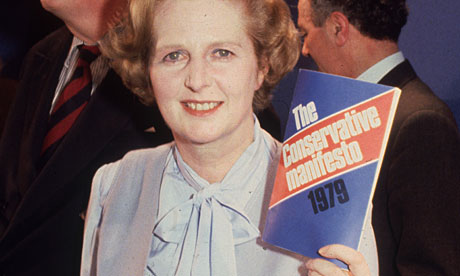
Margaret Thatcher, as those of us who lived through her premiership remember her, projected herself to the voters as a woman (housewife, mother, nanny, girl guide) almost belligerently indifferent to books and culture. She never went to the theatre; preferred Gilbert & Sullivan to Covent Garden; and often declared that her favourite reading was the latest Jeffrey Archer thriller.
It gets worse. Her speeches are memorable for their conviction not their language, which was usually as wooden as her podium expression. If there were jokes, they had to be explained to her, and even then she didn't get it. "The Lady's not for turning", an allusion to Christopher Fry's creaky 1940s verse-drama, The Lady's Not For Burning, bears the marks of a script-writer's midnight desperation. Compared to Winston Churchill, who won a Nobel prize for literature, and left the landscape of English prose on fire with inspiration, Thatcher is a non-starter.
And yet, it would be wrong to write her off, culturally. Thatcher, in fact, leaves a quasi-literary legacy, much of it unintended, that's inescapable. As was said of Christopher Wren on his death, if you want to find his legacy, just look around you. First, there's her own oft-repeated biography, the archetypal tale of rags to riches, of the provincial grocer's daughter who became the first woman to be the queen's first minister. This latterday Dick Whittington story has already inspired at least one movie (The Iron Lady), and many biographies, with more to come.
Part of Thatcher's appeal, in storytelling terms, is that she was an outsider: the scholarship girl who studied chemistry at Oxford, who broke through the glass ceiling to become a woman MP, and then the first woman to lead the Tory party. Not since Disraeli, an English Jew, led the Tories in the 1860s and 70s had the country seen anything quite like it. She was certainly no feminist pioneer, and used to play up her "housewife" image with references to home cooking and child-rearing. She may be a woman, they used to say in the 1970s, but she's no sister.
More widely, Thatcher's conviction politics had a literary and cultural dividend that was completely unintended. Hated by the Irish and the Scots, her politics galvanised cultural nationalism. Alec Salmond and Seamus Heaney both owe something to Thatcher's assault on Celtic Britain. Similarly, her single-minded belligerence towards the working-class communities of the north, especially during the war on the miners, gave rise to all kinds of cultural protest, notably the landmark television series, The Boys from the Blackstuff. Finally, the Falklands war, like all wars, yielded a modest literary and cinematic harvest in movies like Tumbledown.
In the metropolitan south, the satire boom (Spitting Image) and alternative comedy (the Young Ones) would have been unthinkable without Thatcher's divisive programme. Moreover, if there is one group that is usually apathetic towards politics, it must be the London literary scene. Not under Thatcher. It's the paradox of her time in power that the most philistine PM for decades, who delighted in humiliating her arts ministers, saw a boom in bookselling (Waterstones), and publishing, plus the emergence of a new generation of gifted writers, from William Boyd, Kazuo Ishiguro and Hanif Kureishi, to Jeanette Winterson, Will Self, Jonathan Coe and Caryl Phillips, among many. Salman Rushdie paid her the back-handed tribute of putting her in his novel, The Satanic Verses, as Mrs Torture.
Some of the writers who dominated the literary scene during the Thatcher years, notably Martin Amis and Ian McEwan, actually pre-dated her rise to power. But novels like Money and films like The Ploughman's Lunch reflect the upheavals that shaped the first half of her years in power. In hindsight, her torments had a dynamic effect on the cultural community, at an intolerably high price, no doubt. The Britain over which she presided saw many of the cultural innovations whose consequences still shape our lives. On the page, and on the screen, the Britons of 1979-91 remain Thatcher's children.

